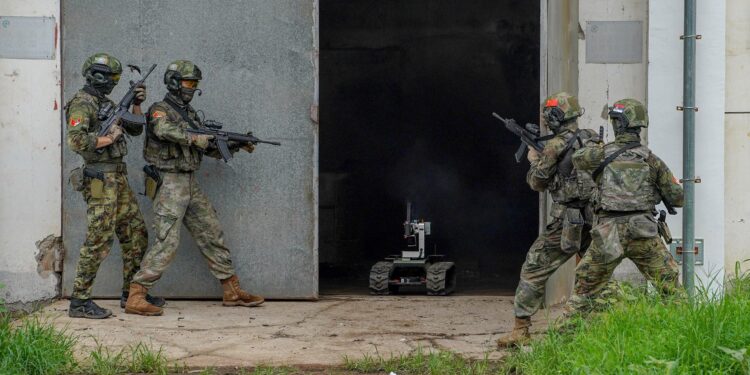A planned joint military exercise between Serbia and China has triggered criticism from European Union officials, highlighting growing concerns over Beijing’s expanding influence in the Balkans. The exercise, set to take place later this year, comes amid heightened geopolitical tensions and ongoing debates within the EU about the strategic implications of deepening Serbia-China defense ties. This development underscores the complexities facing the EU as it seeks to maintain regional stability while addressing China’s increasing presence in southeastern Europe.
Planned Serbia China Military Exercise Raises Tensions Within European Union
The announcement of joint military drills between Serbia and China has stirred considerable unease among European Union member states, highlighting the delicate balance of power in the region. While Serbia emphasizes the exercise as a bilateral effort to enhance mutual defense capabilities, Brussels views the collaboration as a potential geopolitical challenge. Critics argue the move could disrupt the EU’s strategic cohesion, especially given China’s increasing global military footprint and Serbia’s role as a candidate for EU membership.
EU officials have raised concerns focusing on:
- Security implications: Potential shifts in regional power dynamics and the impact on NATO operations.
- Political messaging: The exercise could signal a growing alignment between Belgrade and Beijing, complicating EU integration processes.
- Economic repercussions: Possible influences on EU-China trade relations and investment strategies linked to the Western Balkans.
The upcoming drills, scheduled for later this year, will test interoperability between the Serbian and Chinese forces and are seen by some analysts as a sign of deepening military ties beyond traditional Western alliances.
| Aspect | EU Concern | Serbian Response |
|---|---|---|
| Military Cooperation | Undermining NATO unity | Strengthening regional security |
| Geopolitical Alignment | Shift towards Beijing influence | Non-aligned foreign policy |
| EU Accession | Potential delay or complications | Continued commitment to integration |
EU Officials Warn of Geopolitical Risks Amid Growing China Serbia Defense Ties
EU officials have expressed growing concerns over the planned military exercises between Serbia and China, emphasizing the potential for heightened geopolitical tensions in the Balkans. Diplomats caution that expanding defense cooperation with China could disrupt the region’s stability, complicate EU integration efforts for Serbia, and trigger a strategic recalibration among neighboring countries. The joint drills, slated for later this year, mark a significant step in Beijing’s increasing defense outreach beyond Asia.
Key points raised by EU representatives include:
- Risk of undermining EU’s influence in Southeastern Europe
- Potential challenges to NATO’s security architecture nearby
- Concerns over technology transfer and military transparency
- Increased Chinese military footprint in an EU candidate country
| Aspect | Concerns | Potential Impact |
|---|---|---|
| Military Cooperation | Lack of transparency | Destabilization of regional alliances |
| Technology Sharing | Dual-use tech proliferation | Security risks to EU member states |
| Diplomatic Balance | EU-China-Serbia tension | Slowed accession talks for Serbia |
Experts Call for Enhanced Diplomatic Dialogue to Mitigate Regional Security Concerns
In the wake of Serbia’s announcement to conduct military exercises jointly with China, analysts and diplomats across Europe have underscored the urgent need for bolstered communication channels to ease rising tensions. Several experts emphasize that without proactive engagement and transparent dialogue, the security dynamics in the Balkans could destabilize further, complicating the European Union’s strategic interests in the region. Discussions highlight that a multilateral approach involving Serbia, neighboring countries, and the EU itself could help alleviate suspicions and foster a climate of mutual understanding.
Key recommendations from security analysts include:
- Establishing routine diplomatic forums involving Serbia, China, and EU member states to discuss military collaborations and regional security.
- Promoting confidence-building measures such as joint humanitarian exercises to complement military activities.
- Implementing transparent communication protocols prior to any planned military maneuvers.
| Stakeholder | Priority Focus | Proposed Action |
|---|---|---|
| Serbia | Assert Sovereignty | Enhance transparency with neighbors |
| China | Expand Strategic Partnerships | Engage in confidence-building measures |
| European Union | Maintain Regional Stability | Facilitate multilateral dialogue platforms |
Closing Remarks
As Serbia and China move forward with their scheduled military exercises, the unfolding partnership continues to raise concerns within the European Union, highlighting the broader geopolitical tensions playing out in the Balkans. How Brussels will respond to Belgrade’s deepening ties with Beijing remains a key question in the evolving dynamics between Western institutions and Serbia’s foreign policy choices. Observers will be watching closely as these developments unfold, signaling potential shifts in regional security and diplomatic alignments.
















